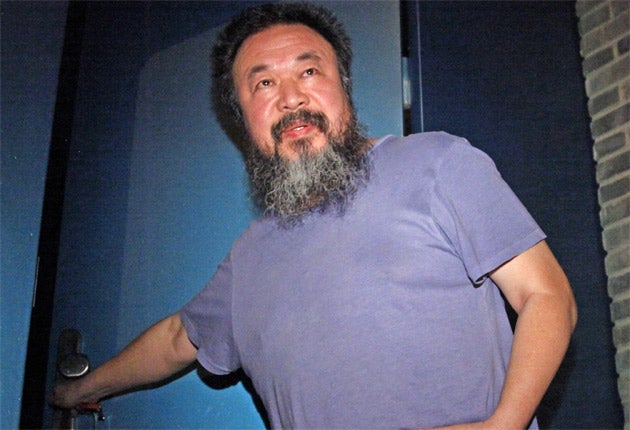Ai Weiwei's words are those of a man who has lost his voice

Your support helps us to tell the story
From reproductive rights to climate change to Big Tech, The Independent is on the ground when the story is developing. Whether it's investigating the financials of Elon Musk's pro-Trump PAC or producing our latest documentary, 'The A Word', which shines a light on the American women fighting for reproductive rights, we know how important it is to parse out the facts from the messaging.
At such a critical moment in US history, we need reporters on the ground. Your donation allows us to keep sending journalists to speak to both sides of the story.
The Independent is trusted by Americans across the entire political spectrum. And unlike many other quality news outlets, we choose not to lock Americans out of our reporting and analysis with paywalls. We believe quality journalism should be available to everyone, paid for by those who can afford it.
Your support makes all the difference.It was just eight months ago that the dissident Chinese artist, Ai Weiwei, told me that revolution was the only way to solve China's problems. Soon after, he was taken away by security officials, emerging frail and subdued in June, after three months of incarceration on alleged tax violations.
Now, in his first full interview since his release, he is communicating again. But fans of the man who called China's Communist Party a group of "gangsters" may have been surprised to read some sentiments he expresses in the Global Times, the only organ he has spoken to at length.
"Overthrowing the regime through a radical revolution is not the way to solve China's problems. The most important thing is a scientific and democratic political system," Ai told the paper, the English-language offshoot of the Communist People's Daily.
While Ai said the interview is real, it reads like it was scripted by the propaganda ministry and has clearly been through the censorship process. The expression "scientific" is pure Communist Party.
"No one is above the law," the avant-garde artist, whose works have been displayed around the world, including at the Tate Modern, said in the interview. The article is not completely toothless, but his remarks about human rights and democracy pale in comparison to his old fiery rhetoric. He said: "I will never avoid politics, none of us can. We live in a politicised society. You give up your rights when you dodge them. Of course you might live an easier life if you abandon some rights. But there are so many injustices and limited educational resources. They all diminish happiness. I will never stop fighting injustice."
There is the air of intimidation hanging over his latest comments. Just a day earlier, he had been back on social networking sites, slamming the way his friends and fellow dissidents were being treated. Technically violating the terms of his bail, which stipulate he must not use Twitter, he urged followers to support Wang Lihong and Ran Yunfei, two jailed human rights activists. On Monday, he also tweeted about the conditions of four associates who had been detained at the same time as him. "They innocently suffered immense mental devastation and physical torment," he wrote.
The comments were quite a leap from his first post-jail forays online, when he was penning enigmatic posts such as: "Lunch 10 dumplings, bodyweight regains 3kg." Ai was freed on bail on 22 June, with the authorities saying he had confessed to evading what the Xinhua news agency called "a huge amount" of tax. Many in the human rights community believe that the charges were trumped up and that Ai was taken out of circulation to remove a long-term thorn in the Communist Party's side.
Talking to Ai since his release, one is struck by the feeling that here is a man who has had the fight knocked out of him. In his heyday he was combative and energetic, but clearly something happened to him in custody that has frightened him.
"There is a suggestion that the pressure is being put on the families," said Kerry Brown, a China expert and head of the Asia Programme at London's Chatham House think-tank. "He's speaking but he's not really speaking."
A source familiar with events surrounding Ai's detention told Reuters in an interview published yesterday that the artist had endured intense psychological pressure during his time behind bars and was interrogated more than 50 times by police who accused him of stirring dissent.
Nonetheless, Ai has already accepted a teaching offer at the Berlin University of the Arts, although it remains to be seen if he is allowed to leave. And shortly after his tweets expressing support for Wang Lihong and Ran Yunfei, Mr Ran was freed. Ai Weiwei's voice may have been quietened. But, it seems, it still carries weight.
Join our commenting forum
Join thought-provoking conversations, follow other Independent readers and see their replies
Comments